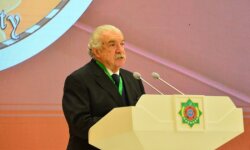The expert drew attention to the problems that remain under Mirziyoyev’s presidency.
 In Uzbekistan with the arrival of President Shavkat Mirziyoyev, the tourism sector has become one of the priority areas in the development of the economy. Deputy Prime Minister Aziz Abdukhakimov, who is in charge of tourism in the country, underlined that the COVID-19 pandemic has a significant negative impact on this area.
In Uzbekistan with the arrival of President Shavkat Mirziyoyev, the tourism sector has become one of the priority areas in the development of the economy. Deputy Prime Minister Aziz Abdukhakimov, who is in charge of tourism in the country, underlined that the COVID-19 pandemic has a significant negative impact on this area.
The deputy prime minister noted that the authorities have developed a set of measures to increase the number of tourists by almost 20 percent in 2021. However, it is not only the pandemic that is negatively affecting tourism. Some actions of the authorities of Uzbekistan lead to a decrease in the tourist popularity of this republic. This opinion was expressed by human rights activist, expert, and oppositionist Bakhrom Khamroev in an interview to CentralAsia.news.
Under the USSR and Karimov
Uzbekistan, of course, is still an interesting place in terms of tourism, said the interviewee. And on the one hand, since Soviet times the authorities constantly declare their understanding of this fact and the desire to develop the tourism industry, but on the other hand, the course of things in Uzbekistan has been steadily decreasing its tourist attractiveness, noted Khamroev.
In Soviet times, according to the expert, there was underdevelopment of the tourist and transport infrastructure in the Uzbek SSR, so citizens preferred to rest in more familiar places, such as Yalta and Sochi, or sanatoriums and boarding houses closer to their permanent places of residence. Foreign tourists in the conditions of the «Iron Curtain» in Uzbekistan were generally rare guests.
The situation changed a little after the republic gained independence. However, there was no real breakthrough in the development of the tourism sector and the influx of foreigners.
— With the collapse of the USSR and the establishment of the regime of Islam Karimov, Uzbekistan became freer for entry, but tourism and recreation in this country became unpleasant because the authorities were forcing the atmosphere of a «besieged fortress». Unpleasant emotions for tourists began from the airport, where it was necessary to declare all the cash to a penny, show laptops and phones for verification, go through stupid and sometimes humiliating conversations with border guards about the purpose of the visit. Then the relevant conversations continued during stops at roadblocks. Foreigners were required to register immediately at the place of stay and were subjected to frequent document checks on the street. There were numerous restrictions on visiting or filming certain places, — said the expert.
The situation in the republic was not particularly conducive to «mental relaxation». Frightened citizens, with their constant fears of provocations from unknown foreigners or hiding secret services, did not contribute to the creation of the feeling of serenity necessary for full relaxation. Against this background, corruption flourished on the part of numerous security officials, who saw tourists as an object of profit against the backdrop of countless and senseless rules and restrictions, noted Khamroev.
Mirziyoyev came to power, and the problems didn’t disappear
With the arrival of the new head of the state, Shavkat Mirziyoyev, restrictions, on the one hand, decreased: checkpoints on the roads disappeared, and the officials reduced pressure on the ones who wanted to make a video about the trip. However, interrogations at the airport have not disappeared, the obligation to register at each place of stay and check documents has not disappeared as well. Accordingly, corruption remains in this area, and even more, with the softening of the policy regime, it has become more widespread. A tourist in Uzbekistan constantly runs the risk of being a victim of bribe-takers in uniform and without it, stated Bakhrom Khamroev.
The interviewee agreed with Abdukhakimov’s opinion about the serious negative consequences for the national tourism industry, which the pandemic had caused. However, the problem with the development of tourism in Uzbekistan relates not only to the coronavirus. Khamroev named two more serious factors that harm the tourism sector. And that is not corruption.
He reminded that the Uzbek government plans to expand the scope of pilgrimage services. It is applied, first of all, to the ancient centers of Muslim culture, such as Bukhara and Samarkand. The interviewee believes that this is indeed a very promising destination that can attract masses of Muslim tourists, including the ones from the Middle East.
— But I can hardly imagine how this intention can be effectively implemented in conditions when, in reality, people practicing Muslims in Uzbekistan continue to be viewed as unreliable persons, and the presence of Muslim literature (including the Koran) and paraphernalia is the basis for close interest on the part of law enforcement officers, accompanied by humiliating interrogation. Unfortunately, reports of these facts did not disappear even with the establishment of a new regime, noted the expert.
Khamroev drew attention to the decrease in the flavor and exoticism of Uzbekistan, which negatively affects the tourist attractiveness of the country. The interviewee stated that now there is a «westernization» of the republic. In his opinion, officials forget about the identity of Uzbekistan in pursuit of making more money. Nobody has developed a strategy for the country’s development, which leads to the loss of its national flavor.
— Uzbekistan is being built up with faceless architecture, sometimes without taking into account the interests of the tourism sector, the old Uzbek mahalla is being destroyed, historical buildings are being demolished, gardens are mercilessly cut down. Their place is taken by houses and shopping centers. Bukhara, once the largest spiritual center, has now become a more secular city than even the capital Tashkent. The only thing that remains is the old facade with Euro-standard design and that is only in the central part of the city. The same situation occurs in other cities, — the interviewee added with regret.



